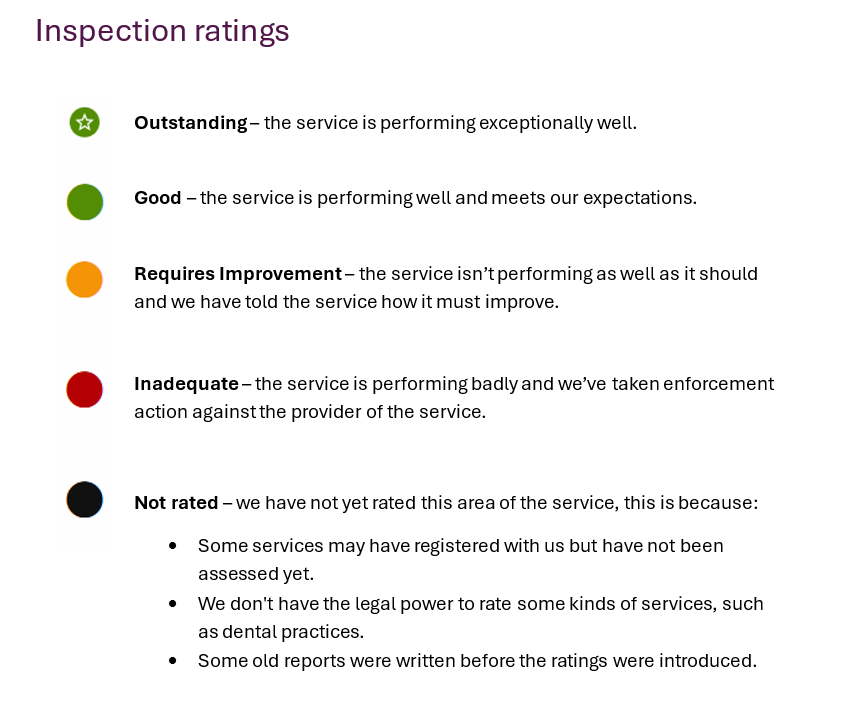What Does This Mean?
Appointment Weeks
Average waiting time for first face to face outpatient appointment from referral. This is defined at the 92 percentile of waiting time in weeks for the first assessment appointment from date of referral.
Surgery Weeks
Average waiting time for surgery from referral. This is defined as the 92 percentile of waiting time in weeks for surgery from the date of referral.
Note: Where Data Not shared by Provider is indicated this may be due to the provider not delivering this service or information is unavailable.
CQC
The Care Quality Commission (CQC) is an independent regulator of health and social care services in England. Their primary role is to ensure that services such as hospitals, care homes, and GP surgeries provide safe, effective, compassionate, and high-quality care. The CQC monitors, inspects, and regulates services to ensure they meet fundamental standards of quality and safety.
What is Overall Rating?
The Overall Rating is a summary rating given to a service based on its performance across the five key questions (Safe, Effective, Caring, Responsive, and Well-led). Services can receive an overall rating of Outstanding, Good, Requires Improvement, or Inadequate. This rating reflects the general quality of care provided.
What is CQC Surgery Rating?
The CQC Surgery Rating specifically pertains to the inspection and evaluation of surgical services within a healthcare provider, such as a hospital or clinic. It assesses how well surgical services meet the CQC’s criteria for safety, effectiveness, care, responsiveness, and leadership. The rating helps patients understand the quality of surgical care provided by that service.

What is NOD?
NOD : National Ophthalmology Database. It is a UK-based initiative that collects and analyzes data on cataract surgery to improve patient outcomes and the quality of care. The NOD Audit helps to monitor and evaluate the performance of cataract surgery procedures and outcomes across various hospitals and clinics.
What is Posterior Capsular Rupture (PCR)?
Posterior Capsular Rupture (PCR) is a complication that can occur during cataract surgery. The capsule is a thin membrane that surrounds the lens of the eye. PCR happens when this membrane is accidentally torn or ruptured during the procedure. This can lead to complications such as lens dislocation, vitreous (gel-like substance) loss, or increased risk of infection. Managing and mitigating PCR is crucial for ensuring successful outcomes in cataract surgery.
What is Avoidance of Vision Loss?
Avoidance of Vision Loss refers to strategies and practices aimed at preventing significant vision deterioration as a result of cataract surgery or other ophthalmic procedures. This includes careful planning and execution of the surgery, appropriate pre-operative assessments, and post-operative care. The goal is to ensure that patients experience minimal visual impairment and achieve the best possible vision outcomes following their treatment.